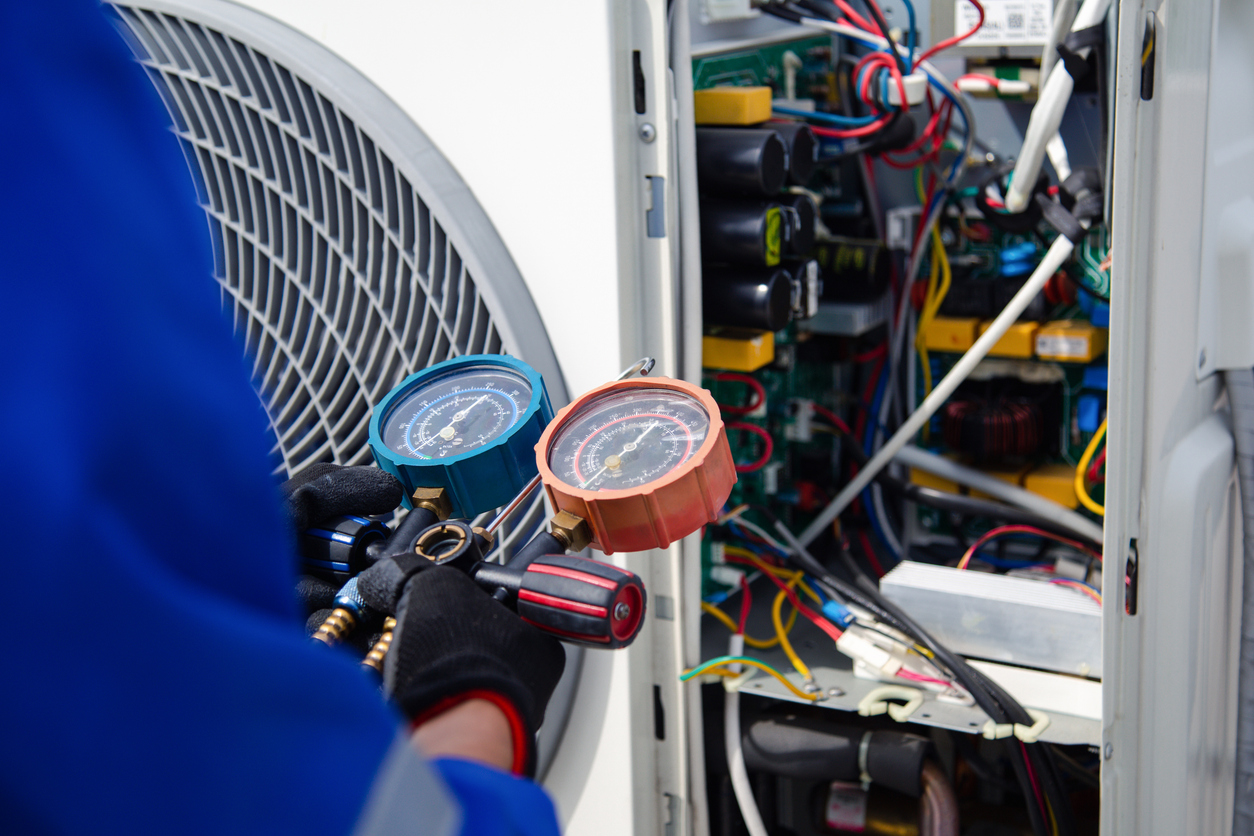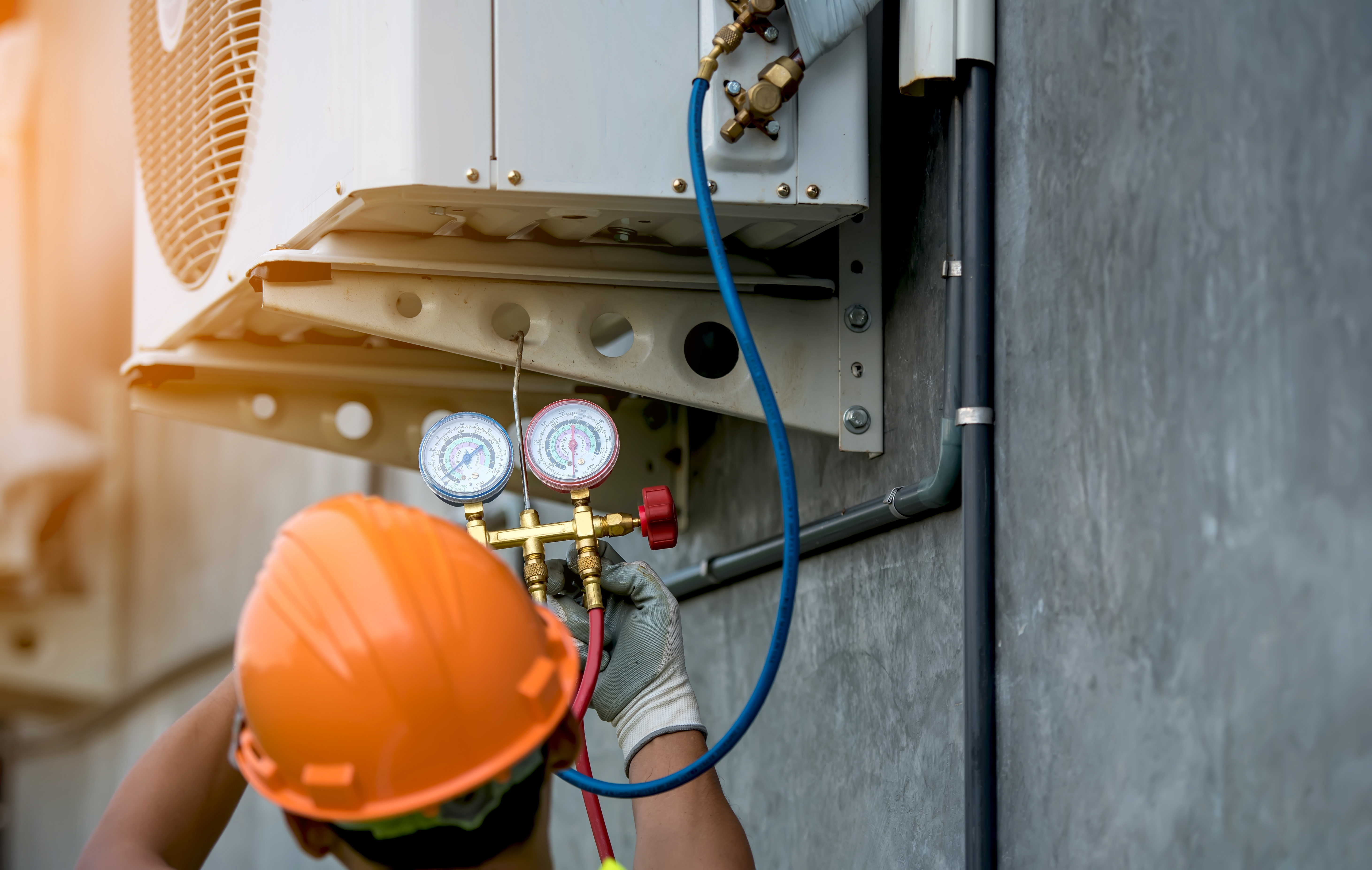The role of regular maintenance in reducing ac fix emergencies
Everything about Heating And Cooling: Identifying Common Issues and Effective Air Conditioning Repair Work Techniques
A/c systems are important for preserving indoor comfort. Comprehending their components and functionality is crucial for recognizing typical problems. House owners commonly face issues such as ineffective cooling, unusual odors, or climbing power expenses. These signs can indicate underlying issues that might call for interest. Exploring DIY troubleshooting techniques can be beneficial, yet recognizing when to look for professional assistance is just as essential. What steps can be required to ensure lasting efficiency?
Recognizing Your HVAC System: Elements and Performance
A HVAC system, often thought about the backbone of interior environment control, is composed of a number of key elements that collaborate to manage temperature and air high quality. The primary components include the home heating device, air flow system, and air conditioning system. The heating unit, typically a heating system or boiler, produces heat during cooler months, while the air conditioning system cools down indoor areas during the summer season.

Common Heating And Cooling Issues Home Owners Encounter
Property owners frequently encounter a number of typical HVAC troubles, consisting of irregular temperature level distribution throughout their home. Furthermore, uncommon sounds throughout operation can indicate underlying concerns that need attention. Dealing with these issues quickly is important for preserving excellent system performance.
Irregular Temperature Level Circulation
Numerous houses experience the aggravating concern of inconsistent temperature distribution, where particular spaces really feel uncomfortably warm while others stay also cool. This problem typically occurs from a range of aspects, consisting of poor insulation, obstructed vents, or an improperly sized HVAC system. When ducts are not sufficiently secured or when furnishings blocks airflow, some rooms might obtain not enough cooling. Furthermore, thermostat placement can significantly impact temperature level regulation; a thermostat located in a sunlit area might misstate the overall temperature of the residence. Routine maintenance, including cleansing filters and making sure ductwork is clear, can aid alleviate these discrepancies. Property owners may likewise consider zoning systems to far better control temperatures throughout various areas of the home, advertising an extra comfy living setting.
Uncommon Sounds During Procedure
When a heating and cooling system runs, uncommon noises can suggest underlying concerns that need attention. Property owners may run into a range of sounds, such as grinding, squeaking, or hissing. Grinding sounds commonly signify worn-out bearings or elements, while squealing can recommend loosened belts or components needing lubrication. Hissing may show a cooling agent leak, which can jeopardize the system's performance. In addition, banging sounds may direct to loose ductwork or an issue with the blower fan. Each of these noises functions as a warning, triggering homeowners to examine further. Ignoring these indications can result in more significant troubles and expensive repairs. Routine maintenance and prompt attention to unusual noises can improve system longevity and efficiency, making sure a comfortable living atmosphere.
Signs That Indicate Your Air Conditioning Needs Repair Service
How can one inform if their air conditioning device requires fixing? A number of indications might show underlying problems requiring expert focus. First, if the AC stops working to cool down the space properly, it may recommend a refrigerant leakage or compressor breakdown. Additionally, a boost in power bills without corresponding use modifications could indicate inefficiency in the system. House owners should likewise be alert to unusual scents rising from the unit, which can suggest mold growth or electric concerns. Moreover, if the AC frequently cycles on and off, it may be an indication of a faulty thermostat or various other mechanical issues. Finally, the existence of water pooling around the unit can suggest a clogged drainpipe line. Identifying these signs early can save money and time, making certain that the a/c system runs effectively and successfully.
Do It Yourself Troubleshooting Techniques for Heating And Cooling Issues
When facing heating his comment is here and cooling problems, home owners can employ a number of do it yourself repairing techniques to identify the problem. Key methods include examining thermostat settings, examining air filters, and assessing drainage problems. These steps can assist identify common malfunctions before seeking specialist aid.
Examining Thermostat Settings
What steps should homeowners require to assure their thermostat settings are correct? First, they ought to confirm the thermostat is established to the wanted temperature level and mode, whether heating or cooling. Checking for a clear display screen and validating the thermostat is not set to "hold" or "vacation" setting is important. Homeowners need to likewise verify that the thermostat is degree and installed in an area without drafts, straight sunlight, or various other temperature affects. Furthermore, rectifying the thermostat can assist provide precise readings. If the thermostat operates batteries, changing them may deal with any kind of problems. By methodically reviewing these elements, house owners can frequently recognize and correct thermostat-related troubles, promoting excellent a/c system efficiency.
Inspecting Air Filters
Air filters play a necessary duty in preserving excellent heating and cooling efficiency. They catch dirt, allergens, and other bits, ensuring clean air circulation. Gradually, filters can become blocked, lowering air flow and performance. To check air filters, individuals need to first situate the filter, commonly located in the return duct or near the furnace. Once located, they need to assess the filter's problem-- if it appears filthy or discolored, it likely needs replacement. The majority of filters need transforming every 1-3 months, depending upon usage and environmental variables. Normal evaluation and prompt substitute of air filters not only improve air high quality but also prolong the life expectancy of a/c systems, protecting against prospective malfunctions and expensive repairs.
Assessing Drain Issues
Just how can property owners properly identify and deal with drain problems within their a/c systems? Initially, they need to check the condensate drain line for obstructions or clogs, which can result in water build-up. Homeowners might use a wet/dry vacuum to clear any type of particles obstructing the line. Next, inspecting the drain frying pan for corrosion or leakages is essential, as a harmed pan can trigger water to overflow. Regular cleaning of the drain line with a blend of vinegar and water aids protect against future obstructions. Furthermore, guaranteeing proper incline of the drainpipe line advertises browse this site reliable water circulation. If these do it yourself strategies do not resolve the issue, seeking advice from an expert cooling and heating technician might be needed to stay clear of prospective water damage and system failing.
When to Call an Expert for Air Conditioning Repair Services

While some AC problems can be taken care of through DIY approaches, there are situations where calling a professional comes to be necessary. Property owners ought to look for expert aid when they experience relentless troubles, such as inadequate air conditioning, unusual sounds, or unusual smells rising from the system. These signs and symptoms might indicate much deeper concerns that require specialized expertise and tools to detect and fix properly.

Preventative Maintenance Tips for Cooling And Heating Longevity
Routine preventative upkeep can greatly boost the long life of a/c systems. Home owners ought to set up annual examinations by certified service technicians to assess system performance and identify potential issues. Consistently changing or cleaning air filters is vital, as this assurances correct air movement and reduces strain on the system. In addition, inspecting and securing ductwork stops power loss and boosts overall performance.
It is likewise suggested to keep the outdoor unit free from particles and vegetation, enabling peak airflow and warm exchange. Home owners ought to examine the condensate drain for clogs to stay clear of water damages and mold growth. Moreover, keeping ideal thermostat setups and making use of programmable alternatives can improve power performance. Recording maintenance tasks aids track service background and can assist in determining recurring problems. By following these preventative actions, people can take full advantage of the efficiency and life-span of their a/c systems
Frequently Asked Inquiries
Exactly how Often Should I Change My Heating And Cooling System Filters?
Heating and cooling system filters should commonly be replaced every one to three months, depending on usage, filter kind, and environmental factors. Normal substitute aids keep performance and air top quality, guaranteeing peak system performance throughout the year.
What Size A/c System Do I Required for My Home?
To identify the proper heating and cooling system dimension for a home, one must take into consideration square video, insulation high quality, and regional environment. Consulting an expert can aid guarantee optimal efficiency and convenience for the certain living area.
Exist Eco-Friendly HVAC Options Available?
Yes, eco-friendly cooling and heating choices are readily available, consisting of energy-efficient heat pumps, solar-powered systems, and geothermal home heating. These alternatives decrease energy intake and environmental effect, promoting sustainability while maintaining effective environment control for residential and business rooms.
Exactly How Can I Boost My HVAC System's Energy Effectiveness?
To boost heating and cooling energy performance, one can frequently keep the system, seal air leakages, set up programmable thermostats, make use of energy-efficient filters, and guarantee ample insulation throughout the home to decrease energy intake and enhance efficiency.

What Is the Average Lifespan of a Cooling And Heating System?
The ordinary hop over to here life-span of a cooling and heating system usually varies from 15 to 25 years, relying on aspects such as upkeep, usage, and the high quality of installment. Routine upkeep can substantially expand its operational long life.
Verdict
In recap, an extensive understanding of HVAC systems empowers property owners to determine usual concerns and address minor troubles efficiently. Identifying indications of malfunction, employing DIY fixing strategies, and prioritizing routine upkeep can enhance system performance and effectiveness. When encountered with complicated repairs, enlisting specialist assistance is crucial to guarantee safety and security and long life. By promoting awareness and proactive care, people can take pleasure in a comfy interior atmosphere while minimizing unforeseen prices related to a/c failings.